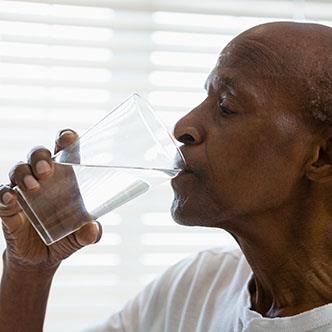
While drinking more water can boost kidney function, a coaching program that encourages water consumption failed to improve outcomes in patients with kidney disease after one year. Results of the study were recently published in the Journal of the American Medical Association, which explored the long-term benefits of water consumption in patients with stage 3 kidney disease.
Chronic kidney disease is a common condition that causes the gradual loss of kidney function over time. It affects an estimated 15% of U.S. adults, most of whom don’t know they have it.
Unfortunately, there is no cure for chronic kidney disease and it can eventually lead to kidney failure. Therefore, the goal of treatment is to slow its effects and preserve kidney function over time.
Many studies suggest that increased water intake promotes better kidney function. However, little is known about the effects of water intake in patients with chronic kidney disease.
To learn more, researchers conducted the Chronic Kidney Disease Water Intake Trial, which took place at nine medical centers in Ontario, Canada. It included 631 patients with stage 3 kidney disease who reported normal fluid intake (no more than 10 cups of water a day before the intervention).
Through the study, half of participants received a year of phone-based coaching to increase water consumption. Participants in this group were encouraged to increase water intake by 1–1.5 liters a day, depending on their sex and weight, and received drinking containers and water vouchers throughout the study.
The remaining half of participants in the control group were advised to continue with their usual fluid intake.
After tracking participants’ urine output throughout the study, researchers found that fluid intake significantly increased in the hydration group compared to the control group. However, the intervention had no significant impact on participants’ kidney function after one year.
Kidney function was measured by a number of factors including eGFR (estimated glomerular filtration rate), plasma copeptin, creatinine clearance and urine albumin, all of which show how well the kidneys are working.
While coaching had no clear impact on kidney function after one year, researchers note that it may have been in part due to study design. It’s possible that the effects of the intervention were too low or that the study was too short to detect a difference in outcomes. It’s also possible that the increase in water consumption in the hydration group was not large enough to have a meaningful impact on kidney function.
As a result, authors encourage future research to explore the issue. With larger studies, we can get a clearer picture about the impact of water consumption in patients with chronic kidney disease. With this additional information, experts hope to better understand the impact of fluid consumption and provide clearer guidelines about water consumption for patients living with kidney disease.